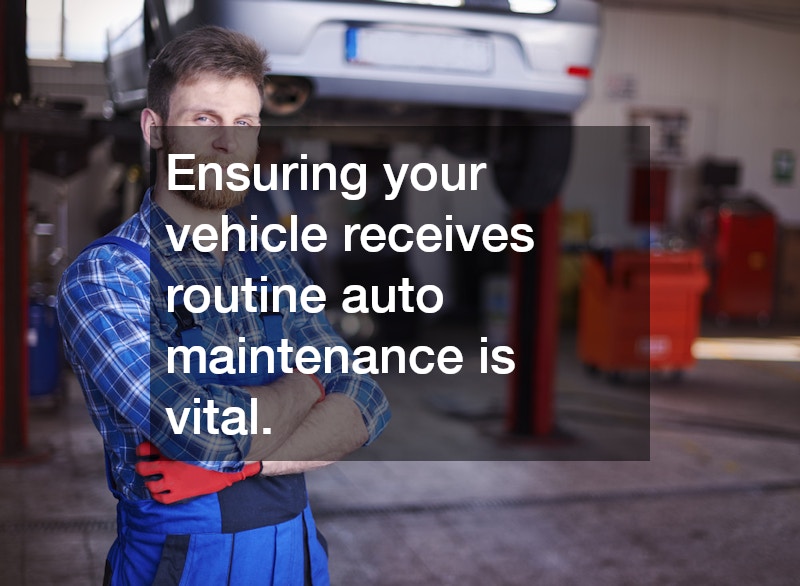Essential Auto Maintenance Appointments You Should Never Skip


Keeping your vehicle in top condition is not just about appearance; it’s crucial for safety and reliability. Regular auto maintenance can save you from expensive repairs and increase the lifespan of your car. In this article, we will examine the essential auto maintenance appointments you should never skip to ensure your vehicle remains in optimal working condition.
Regular Oil Changes
Oil changes are a fundamental aspect of auto maintenance that keeps your engine running smoothly. Old or dirty oil can cause engine parts to wear out faster and may result in costly repairs down the line.
Mechanics recommend changing the oil every 3,000 to 5,000 miles, depending on your vehicle’s make and model.
Fresh oil reduces engine friction, which in turn, helps improve fuel efficiency. By maintaining a clean engine, you also contribute to lower emission rates, which benefits the environment. Missing routine oil changes can lead to decreased engine performance and eventually, engine failure.
Neglecting oil changes can also result in thicker engine oil, causing parts to corrode more quickly. Such negligence might even void any existing engine warranties you may have. Therefore, adhering to a consistent oil change schedule is critical for prolonging your car’s lifespan.
Tire Rotations and Alignment
Tire rotations and alignment are often overlooked but are essential auto maintenance procedures. Rotating your tires helps to distribute tread wear evenly, allowing the tires to last longer. Ideally, tires should be rotated every 6,000 to 8,000 miles, or as specified in your car owner’s manual.
Properly aligned wheels ensure a smoother ride and prevent the car from straying as you drive. Poor alignment can result in uneven tire wear and a decrease in fuel efficiency. Addressing alignment issues promptly can help maintain your vehicle’s performance and avoid unnecessary expenses.
Tire maintenance also involves checking tire pressure regularly, which is vital for optimal fuel economy and safe handling. Under-inflated tires can lead to blowouts and increase the risk of accidents. Always make tire rotation and alignment a priority during your auto maintenance appointments.
Brake Inspections
Brake inspections are a critical part of any auto maintenance routine. Your vehicle’s brake system is key to your safety, and identifying issues early can prevent accidents. Brakes should be inspected at least once a year, or more frequently if you notice any performance issues.
Signs that your brakes may need attention include squealing noises, a spongy brake pedal, or the vehicle pulling to one side when braking. Drivers who frequently encounter stop-and-go traffic may need to have their brakes checked more often. Addressing these issues promptly can extend the life of your brake components and enhance driving safety.
Battery Checks and Replacements
Your car’s battery is crucial for powering the engine and various electrical components, making battery checks a necessary auto maintenance practice. A dead battery can leave you stranded, so regular inspections are essential to avoid inconvenience. Most auto experts recommend testing your battery’s charge and condition at least twice a year.
Hot weather can evaporate the battery fluid, leading to corrosion on terminals and connections. This can result in starting issues and reduced battery life. Consider having your battery tested during regular maintenance visits to ensure it is in good condition and replace it if necessary.
If your vehicle struggles to start or you notice dim headlights, it might be time for a battery replacement. Proactive care can save you from the surprise of a dead battery at the most inconvenient time. Appropriate battery maintenance ensures reliability and peace of mind while on the road.
Fluid Checks and Top-offs
Beyond engine oil, various other fluids play significant roles in maintaining your vehicle’s performance. These include transmission fluid, brake fluid, coolant, and power steering fluid. Checking and topping off these fluids should be a regular aspect of your auto maintenance schedule.
Low fluid levels or dirty fluids can result in reduced vehicle performance and potential damage to critical components. Regularly checking and maintaining proper fluid levels can help prevent overheating, ensure smooth gear shifts, and enable responsive steering. This routine maintenance allows your vehicle to operate efficiently and safely.
Ensuring your vehicle receives routine auto maintenance is vital for maintaining its performance and safety. Regular oil changes, tire rotations, brake inspections, battery checks, and fluid top-offs are cornerstones to a well-functioning vehicle. By staying committed to these essential appointments, you not only protect your investment but also ensure a safe and efficient driving experience for years to come.
.



